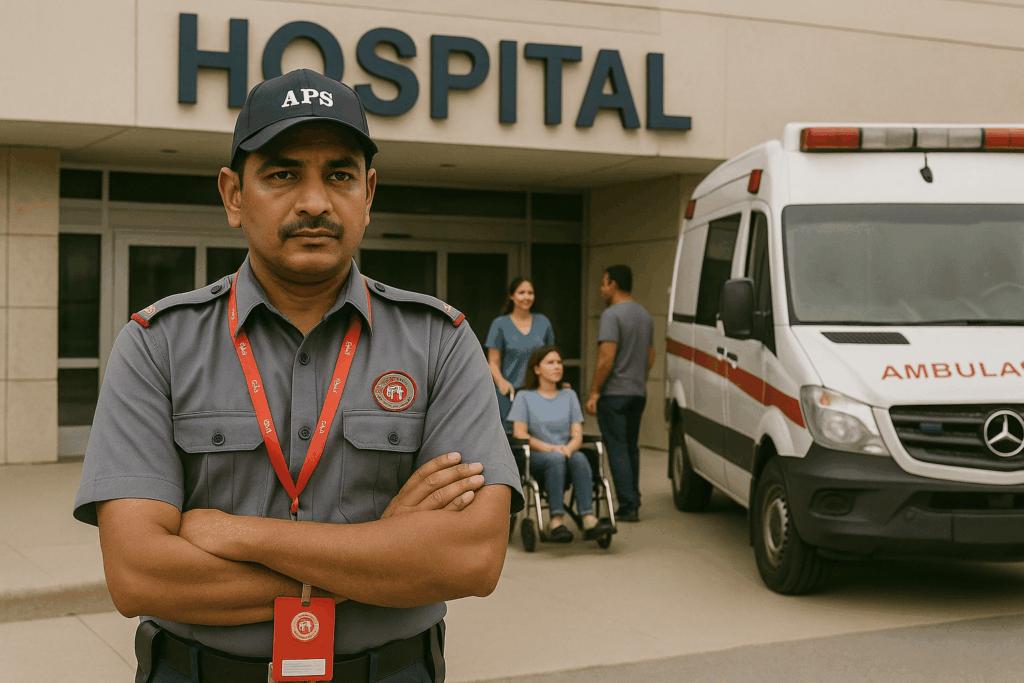
Hospitals are spaces of healing, care, and critical decision-making. But alongside the medical responsibilities lies another non-negotiable priority: security. With high footfall, sensitive areas, valuable equipment, and emotionally charged environments, healthcare facilities face unique risks. This is why having trained hospital security staff on duty around the clock is no longer optional, it’s essential.
This blog explores why 24×7 security is critical for healthcare settings, the risks involved, and how the right security team can help maintain safety, order, and operational flow.
Why Hospitals Need 24×7 Security Services
Hospitals never sleep. Medical emergencies arise at any hour, and patients, staff, and visitors move through the facility day and night. In such an environment, threats don’t follow a 9-to-5 schedule. Here are key reasons why 24×7 security services are vital in hospitals:
1. Unrestricted Public Access
Unlike corporate offices or gated communities, hospitals are open spaces. People enter with minimal checks, often in a state of urgency or distress. Without constant security supervision, it becomes difficult to manage who’s entering, where they’re going, and what their intent might be.
2. Protection of Patients and Staff
Security guards play a crucial role in maintaining order in emergency rooms, maternity wards, and ICUs — especially in cases involving agitated relatives or patients under distress. Assaults on medical staff, though unfortunate, have been reported increasingly in India. The presence of trained security guards for healthcare facilities helps prevent such incidents.
3. Safeguarding Equipment and Drugs
Hospitals store advanced medical machinery, confidential patient data, and controlled drugs that are vulnerable to theft or misuse. A 24×7 surveillance plan deters unauthorized access to such sensitive areas.
4. Crowd Control During Emergencies
During large scale emergencies, accidents, pandemics, or disasters, hospitals experience sudden spikes in patient intake. A trained security team ensures that crowds are managed, entries are controlled, and emergency protocols are followed without disruption.
Key Responsibilities of Hospital Security Staff
Hospital security is a specialized field. Unlike other commercial settings, it requires guards who understand medical protocols, handle high-pressure situations calmly, and communicate effectively with medical professionals and the public.
Trained hospital security staff are responsible for:
- Monitoring all access points and patient areas
- Ensuring visitor protocols are followed
- Responding swiftly to emergencies and alarms
- Assisting in evacuations, fire drills, or disaster responses
- Managing aggressive or disruptive individuals
- Preventing unauthorized access to operation theaters, ICUs, and pharmacies
- Supporting patient and staff movements during high alert situations
At Alsecure, our healthcare security guards are trained not just in surveillance and emergency handling, but also in soft skills such as empathy, restraint, and calm communication.
24×7 Security Is About More Than Just Guards
While personnel presence is essential, true 24×7 hospital security involves a combination of human supervision and smart systems. Here’s what an effective healthcare security plan includes:
Allsecure’s perimeter control services include:
1. Electronic Surveillance
CCTV cameras strategically installed at entrances, hallways, elevators, and sensitive zones provide live monitoring. Alsecure’s electronic security solutions help detect unusual activity in real-time.
2. Access Control Systems
Biometric or RFID-based access control systems ensure that only authorized individuals enter certain areas like ICUs, operating theaters, and pharmacy storage rooms.
3. Fire and Emergency Response Readiness
Trained guards must know how to respond to medical alarms, fires, and building evacuations quickly and systematically.
4. Round the Clock Monitoring
Even in the late-night hours, hospitals remain vulnerable to break-ins, patient escapes, or medical emergencies. With a control room and on-ground guards working in shifts, 24×7 coverage ensures no gap in supervision.
Benefits of Outsourcing Hospital Security to a Trusted Partner
For hospital administrators, managing an internal security force can be challenging — especially when it comes to training, scheduling, and compliance. That’s where professional security agencies come in.
When you hire a reputed provider of 24×7 security services like Alsecure, you get:
- Verified and trained guards with experience in healthcare settings
- Timely shift rotations without compromising coverage
- Access to additional electronic surveillance systems and control room support
- Flexibility to scale the team size during emergencies or public events
- Seamless compliance with local regulations and certifications
Alsecure provides a PAN-India presence, decades of experience, and a proactive operations team that understands the unique dynamics of healthcare security.
Areas That Require Special Security Attention in Hospitals
Not all areas within a hospital are equally sensitive. A good security plan focuses on:
- Emergency Room: The most unpredictable zone, needing constant monitoring.
- Maternity and Pediatric Units: Require access restrictions for infant safety.
- ICUs and Operating Theatres: Limited access zones with strict protocols.
- Pharmacies and Drug Storage: High risk for theft and misuse.
- Staff Rooms and Admin Blocks: Where patient records and valuable data are stored.
- Parking Lots: Vulnerable to unauthorized access and patient-related incidents.
Proper surveillance and stationed guards in these zones ensure patient safety and institutional accountability.
Building a Culture of Safety
More than just a security service, hospitals must foster a culture where safety is visible, responsive, and trusted by all. When visitors see uniformed guards at entries, when staff know there’s a backup plan for emergencies, and when patients feel safe leaving valuables in their rooms — the entire facility functions with more confidence.
Hospital security should blend firmness with empathy. Guards must understand that they’re not just protecting a building, but supporting an environment of healing.
As healthcare becomes more advanced, the need to safeguard it becomes more urgent. Hospitals today are more than treatment centers — they are operational hubs, data centers, and safe havens for thousands of people each day.
Investing in round-the-clock protection is an investment in trust, safety, and operational continuity.Looking for experienced, certified, reliable hospital security staff or 24×7 security services for your healthcare facility?
Get in touch with Allsecure today to plan a customized solution tailored for your hospital’s needs.


